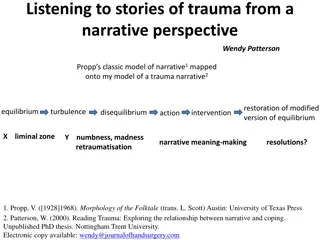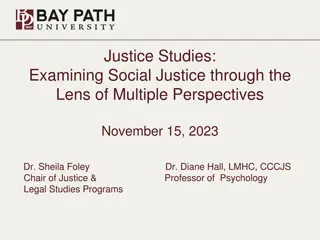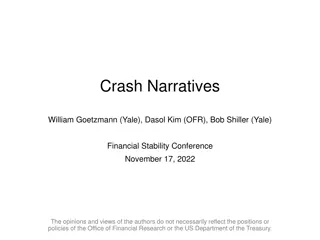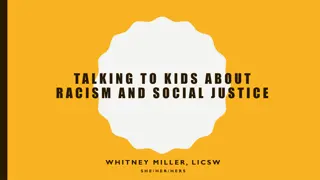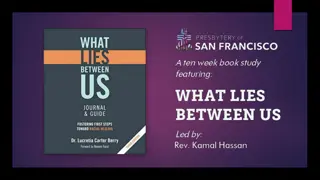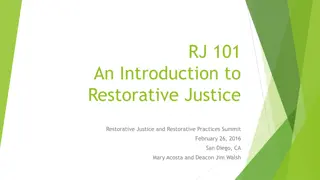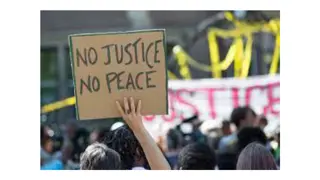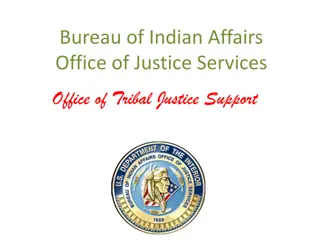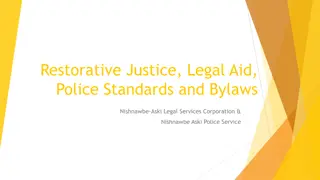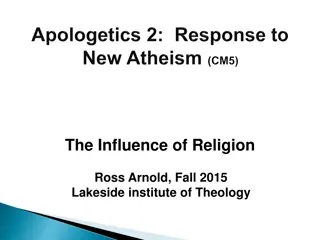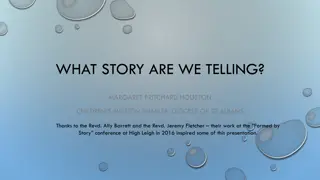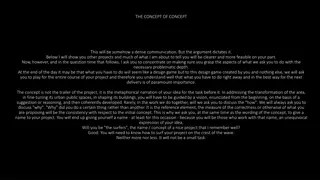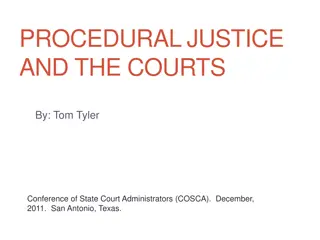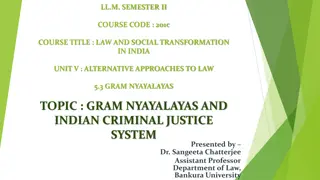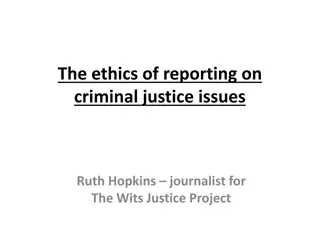Exploring Biblical Justice and Narratives
Delve into the concept of Biblical justice, grounded in God's character and narrative, through key passages and narratives from Genesis and Exodus. Understand the themes of order, harmony, and redemption as portrayed in the Biblical context.
Download Presentation

Please find below an Image/Link to download the presentation.
The content on the website is provided AS IS for your information and personal use only. It may not be sold, licensed, or shared on other websites without obtaining consent from the author. Download presentation by click this link. If you encounter any issues during the download, it is possible that the publisher has removed the file from their server.
E N D
Presentation Transcript
Biblical Justice What comes to mind when you hear the word justice ? What struggles and tensions do you feel when you think about justice
Biblical Justice Biblical Justice is: Grounded in God s character Grounded in narrative the biblical story
Biblical Justice Looking at biblical justice: Important biblical terms Representative passages
Biblical Justice GENESIS NARRATIVE: 1 and 3 Creation: Picture of Order Picture of Harmony Picture of Flourishing Picture of Shalom Picture of Intent and Future
Biblical Justice GENESIS NARRATIVE: Fall: Harmony is lost Guilt, Shame, and Fear, Power Consequences - descriptive
Biblical Justice EXODUS NARRATIVE: Exodus 3: 7-10 and 6: 2-9 7The LORD said, I have indeed seen the misery of my people in Egypt. I have heard them crying out because of their slave drivers, and I am concerned about their suffering. 8 So I have come down to rescue them from the hand of the Egyptians and to bring them up out of that land into a good and spacious land, a land flowing with milk and honey the home of the Canaanites, Hittites, Amorites, Perizzites, Hivites and Jebusites. 9 And now the cry of the Israelites has reached me, and I have seen the way the Egyptians are oppressing them.
Biblical Justice EXODUS NARRATIVE: Exodus 3: 7-10 and 6: 2-9 2God also said to Moses, I am the LORD. 3 I appeared to Abraham, to Isaac and to Jacob as God Almighty, but by my name the LORD I did not make myself fully known to them. 4 I also established my covenant with them to give them the land of Canaan, where they resided as foreigners. 5 Moreover, I have heard the groaning of the Israelites, whom the Egyptians are enslaving, and I have remembered my covenant. 6 Therefore, say to the Israelites: I am the LORD, and I will bring you out from under the yoke of the Egyptians. I will free you from being slaves to them, and I will redeem you with an outstretched arm and with mighty acts of judgment.
Biblical Justice EXODUS NARRATIVE: Exodus 3: 7-10 and 6: 2-9 7 I will take you as my own people, and I will be your God. Then you will know that I am the LORD your God, who brought you out from under the yoke of the Egyptians. 8 And I will bring you to the land I swore with uplifted hand to give to Abraham, to Isaac and to Jacob. I will give it to you as a possession. I am the LORD.
Biblical Justice EXODUS NARRATIVE: 3 and 6 Current Reality of Israelites Oppressed spiritually idol worship Oppressed physically hard labor Oppressed emotionally no freedom or agency Oppressed economically no resources, participation, or access
Biblical Justice EXODUS NARRATIVE: 3 and 6 Liberation/Deliverance: Spiritual deliverance worship Yahweh Physical and Emotional freedom and agency Economic deliverance rescue from unjust structures
Biblical Justice EXODUS NARRATIVE: 3 and 6 Exodus was rescue FROM injustice and oppression TO freedom Exodus was all encompassing Scarcity to Abundance
Biblical Justice EXODUS NARRATIVE: 19:3-6 Three Roles for Israel: Treasured Possession Kingdom of Priests Holy Nation
Biblical Justice Different kinds of justice Retributive Distributive Creative
Biblical Justice EXODUS NARRATIVE: 19:3-6 3 Then Moses went up to God, and the LORD called to him from the mountain and said, This is what you are to say to the descendants of Jacob and what you are to tell the people of Israel: 4 You yourselves have seen what I did to Egypt, and how I carried you on eagles wings and brought you to myself. 5 Now if you obey me fully and keep my covenant, then out of all nations you will be my treasured possession. Although the whole earth is mine, 6 you will be for me a kingdom of priests and a holy nation. These are the words you are to speak to the Israelites.
Biblical Justice Justice in the Legal Codes: Old Testament Representative Passage Deut 24: 10-18
Biblical Justice Deut 24: 10-13 10 When you make a loan of any kind to your neighbor, do not go into their house to get what is offered to you as a pledge. 11 Stay outside and let the neighbor to whom you are making the loan bring the pledge out to you. 12 If the neighbor is poor, do not go to sleep with their pledge in your possession. 13 Return their cloak by sunset so that your neighbor may sleep in it. Then they will thank you, and it will be regarded as a righteous act in the sight of the LORD your God.
Biblical Justice Deut 24: 10-13 Loans: No interest on loans unique in ANE Dignity Not a business deal based on need of the borrower Righteous act - theology
Biblical Justice Deut 24: 10-18 14 Do not take advantage of a hired worker who is poor and needy, whether that worker is a fellow Israelite or a foreigner residing in one of your towns. 15 Pay them their wages each day before sunset, because they are poor and are counting on it. Otherwise they may cry to the LORD against you, and you will be guilty of sin. 16 Parents are not to be put to death for their children, nor children put to death for their parents; each will die for their own sin. 17 Do not deprive the foreigner or the fatherless of justice, or take the cloak of the widow as a pledge. 18 Remember that you were slaves in Egypt and the LORD your God redeemed you from there. That is why I command you to do this.
Biblical Justice Deut 24: 10-18 Hired Workers: Vulnerable triad: orphans, widows, foreigners(immigrants/refugees) Not a business deal do not take advantage No difference between Israelite or foreigner Cry out and guilty of sin Individual responsibility Motivational clauses liberation from slavery - remember
Biblical Justice Deut 24: 10-18 19 When you are harvesting in your field and you overlook a sheaf, do not go back to get it. Leave it for the foreigner, the fatherless and the widow, so that the LORD your God may bless you in all the work of your hands. 20 When you beat the olives from your trees, do not go over the branches a second time. Leave what remains for the foreigner, the fatherless and the widow. 21 When you harvest the grapes in your vineyard, do not go over the vines again. Leave what remains for the foreigner, the fatherless and the widow. 22 Remember that you were slaves in Egypt. That is why I command you to do this.
Biblical Justice Deut 24: 19-22 It belongs to Wright Participation in community Access to resources Divine gift Excess is for the community
Biblical Justice HISTORICAL BOOKS: Israel moves from the Mosiac vision to Inequality and Injustice
Biblical Justice PROPHETIC ROLE: Idolatry Injustice
Biblical Justice Echoes of Justice in the New Testament: Luke 3: 3-18
Biblical Justice Echoes of Justice in the New Testament: Luke 3: 3-18 How is John the Baptist preparing people for Jesus? What echoes of the Old Testament do you observe?
Biblical Justice Echoes of Justice in the New Testament: Luke 3: 3-18 3 He went into all the country around the Jordan, preaching a baptism of repentance for the forgiveness of sins. 4 As it is written in the book of the words of Isaiah the prophet: A voice of one calling in the wilderness, Prepare the way for the Lord, make straight paths for him. 5 Every valley shall be filled in, every mountain and hill made low. The crooked roads shall become straight, the rough ways smooth. 6And all people will see God s salvation.
Biblical Justice Echoes of Justice in the New Testament: Luke 3: 3-18 7John said to the crowds coming out to be baptized by him, You brood of vipers! Who warned you to flee from the coming wrath? 8 Produce fruit in keeping with repentance. And do not begin to say to yourselves, We have Abraham as our father. For I tell you that out of these stones God can raise up children for Abraham. 9 The ax is already at the root of the trees, and every tree that does not produce good fruit will be cut down and thrown into the fire. 10 What should we do then? the crowd asked.
Biblical Justice Echoes of Justice in the New Testament: Luke 3: 3-18 11John answered, Anyone who has two shirts should share with the one who has none, and anyone who has food should do the same. 12 Even tax collectors came to be baptized. Teacher, they asked, what should we do? 13 Don t collect any more than you are required to, he told them. 14 Then some soldiers asked him, And what should we do? He replied, Don t extort money and don t accuse people falsely be content with your pay. 15 The people were waiting expectantly and were all wondering in their hearts if John might possibly be the Messiah.
Biblical Justice Echoes of Justice in the New Testament: Luke 3: 3-18 16John answered them all, I baptize you with water. But one who is more powerful than I will come, the straps of whose sandals I am not worthy to untie. He will baptize you with the Holy Spirit and fire. 17 His winnowing fork is in his hand to clear his threshing floor and to gather the wheat into his barn, but he will burn up the chaff with unquenchable fire. 18 And with many other words John exhorted the people and proclaimed the good news to them.
Biblical Justice Themes of Justice: New Testament Straight paths indicate justice/Crooked paths indicate injustice(Isaiah)
Biblical Justice Themes of Justice: New Testament Actions keeping with repentance Societal justice All the groups in the crowd are addressed Vs 11: return to common good enough and not too much Everyone s needs being met
Biblical Justice Themes of Justice: Parables Parable of the Workers in the Vineyard
Biblical Justice Themes of Justice: Parables Matthew 20: 1-16 1 For the kingdom of heaven is like a landowner who went out early in the morning to hire workers for his vineyard. 2 He agreed to pay them a denariusfor the day and sent them into his vineyard. 3 About nine in the morning he went out and saw others standing in the marketplace doing nothing. 4 He told them, You also go and work in my vineyard, and I will pay you whatever is right. 5So they went. He went out again about noon and about three in the afternoon and did the same thing.
Biblical Justice 6 About five in the afternoon he went out and found still others standing around. He asked them, Why have you been standing here all day long doing nothing? 7 Because no one has hired us, they answered. He said to them, You also go and work in my vineyard. 8 When evening came, the owner of the vineyard said to his foreman, Call the workers and pay them their wages, beginning with the last ones hired and going on to the first. 9 The workers who were hired about five in the afternoon came and each received a denarius.
Biblical Justice 10 So when those came who were hired first, they expected to receive more. But each one of them also received a denarius. 11 When they received it, they began to grumble against the landowner. 12 These who were hired last worked only one hour, they said, and you have made them equal to us who have borne the burden of the work and the heat of the day. 13 But he answered one of them, I am not being unfair to you, friend. Didn t you agree to work for a denarius? 14 Take your pay and go. I want to give the one who was hired last the same as I gave you. 15Don t I have the right to do what I want with my own money? Or are you envious because I am generous? 16 So the last will be first, and the first will be last.
Biblical Justice Matthew 20: 1-16 If you were a movie director, how would you film the scenario at the end of the day? Why are the first hired workers so angry?
Biblical Justice Matthew 20: 1-16 Landowner: Repeatedly goes to the pick-up spot Agreed to pay whatever is right
Biblical Justice Matthew 20: 1-16 Payment: Last are called first reversal of society s normal rules Expectation - payment would fit effort Entitlement based on their perceived efforts in comparison to the others Desire was for equality (the same amount for all)
Biblical Justice Matthew 20: 1-16 Response of Landowner: Landowner was faithful to the law for first workers Not just to the world but just in the kingdom Preferential treatment for the disadvantaged Picture of God s grace to us!
Biblical Justice Themes about Justice from the New Testament: Equality vs Equity
Biblical Justice Summary: Theology flows into social and economic ethics Justice is grounded in God s character Justice is grounded in the narrative of shalom, flourishing, holistic redemption Justice is both retributive and distributive Justice is about equity and reflects God s grace to us
Biblical Justice What areas of life follow the world s perspective of justice rather than biblical justice? How can you practically live out biblical justice in a specific area of your life/community?



